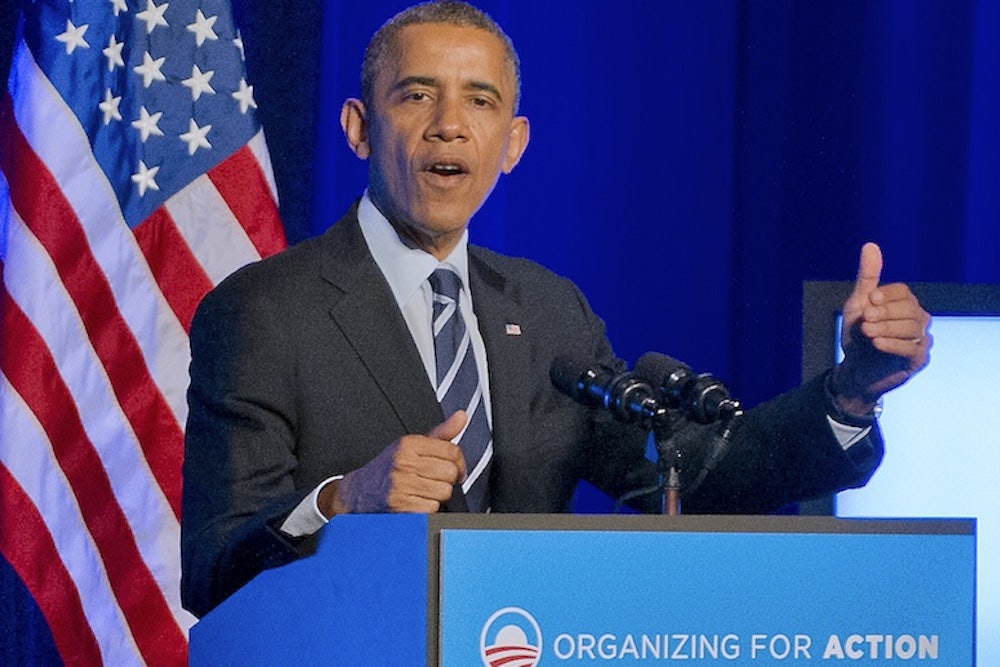The Obama Administration on Monday announced that it is pushing back the employer mandate—the requirement that companies pay some kind of penalty if they fail to provide full-time employees with health coverage. This is not the first time the administration has done this. Last July, the Administration made a similar announcement.
At the time, the law’s critics argued that the White House was thinking about politics—that officials were trying to quiet employers angry about the new requirement and its associated paperwork, while postponing dislocations that might come back to haunt Democrats politically. The law’s defenders argued that the real motive was policy—by delaying the mandate, this argument went, the administration was merely trying to make the transition to a new insurance system easier. Of course, the two explanations aren’t mutually exclusive. Both might have been valid then—and both might be valid now.
The requirement itself is pretty straightforward: Employers with 50 or more employees must make comprehensive, affordable insurance available to all full-time employees. Roughly speaking, the law defines "comprehensive" as any plan that would pay for 60 percent of the typical person's medical costs. It defines "affordable" as premiums that are less than 9.5 percent of an individual employee's income. And it defines "full-time" as workers who put in more than 30 hours a week. Companies that don’t satisfy the employer requirement face various sorts of penalties, depending—in part—on where employees go to get coverage instead. In July, the administration effectively postponed the compliance date by one year, saying that penalties wouldn’t apply until calendar year 2015.
On Monday, the administration said penalties for one class of businesses—companies with 50 to 99 employees—wouldn’t apply for an additional year. In other words, those companies have until calendar year 2016 to provide all employees with coverage. The administration on Monday also gave an extension to a second class of employers—those with at least 100 employees. But that change is a little different. Those large employers will still face penalties starting in 2015. The change is in how employers avoid the penalty. In that first year, the administration said, the employers need only make sure 70 percent of full-time workers can get company insurance. Then, by 2016, the employers must make sure 95 percent of full-time workers can get company insurance.
What’s the primary rationale? It's impossible to say. The official explanation is the same as before—the move will give companies a little extra time and flexiblity, easing the transition to the newly reformed health care system. That makes perfect sense. On the other hand, administration officials might also have other goals in mind. For example, they might be anxious about employers taking certain actions—like limiting the hours of workers, in order to avoid giving those workers health insurance. Administration economists have said they don’t see evidence this is happening on a large scale and the Congressional Budget Office just last week came to the exact same conclusion. But anecdotes of such decisions have been all over the media. (Jed Graham of Investor's Business Daily has been tracking them.) Whether or not the problem is real, it might appear real.
There's no such ambiguity about the impact of the change. It will be small. The vast majority of large employers offer insurance already; companies with 50 to 99 employees constitute just 2 percent of employers and 7 percent of the private workforce; and companies with fewer than 50 employees were never subject to this requirement in the first place. An Urban Institute analysis published in July 2013, after the previous delay, concluded that the employer requirement "has almost no effect on overall coverage under the ACA or the distribution of that coverage across public and private sources of coverage." The primary purpose of the requirement is to raise revenue; delaying its effective date by a year or two or three simply doesn't constitute a big change of dollars. And while the requirement means some companies will be slower to extend insurance to some employees, anybody without an offer of decent insurance can get coverage through the exchanges—where, for lower-income workers, it will be cheaper anyway.
Attribute to the administration whatever motives you would like—noble, cynical, a combination of both. And if you want to curse the employer requirement altogether, you'll have plenty of company. Most economists and policy experts don't like it either. But this decision shouldn't make much difference in how many Americans ultimately get health insurance.
